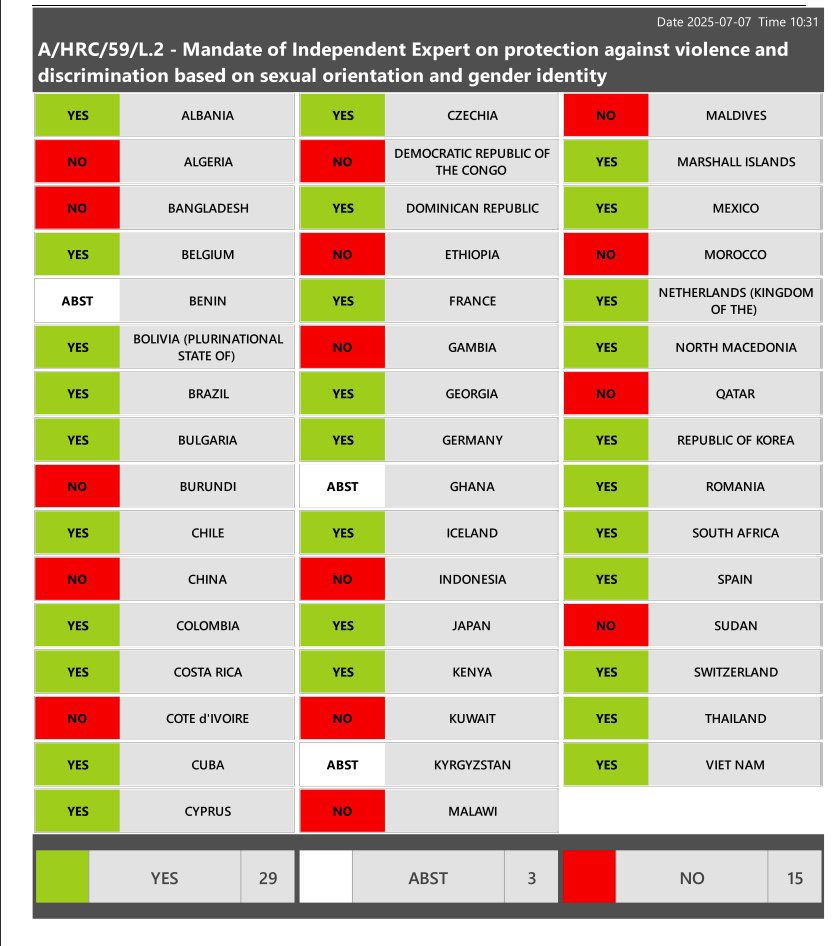Kenya and South Africa lone African votes to support UN expert on sexual orientation
Joto La Jiwe is a Ugandan correspondent for the African…
Kenya’s vote surprised many who’d seen increasing anti-LGBT sentiment in the African country

Kenya was one of the 29 countries and members of the United Nations Human Rights Council that voted in favour of extending the mandate of the UN’s Independent Expert on Sexual Orientation and Gender Identity (SOGI). Fifteen countries voted against while three countries abstained from the vote held on July 7, 2025.
The vote means that the incumbent expert Graeme Reid from South Africa will continue assessing the implementation of international human rights law, investigating violence and discrimination against LGBT and gender diverse persons, and advising states and UN agencies on LGBT issues for three more years.
“I am deeply grateful for the overwhelming support of 1,259 civil society organisations from 157 countries who rallied for the mandate’s renewal. This vote is not just a decision—it’s a message of hope,” Reid posted on X.
South Africa and Kenya were the only African countries to vote in favour of the renewal. Algeria, Burundi, Côte d’Ivoire, the Democratic Republic of Congo (DRC), Ethiopia, Gambia, Malawi, Morocco, Sudan, and the Maldives voted against while Benin and Ghana abstained.

Unlike South Africa, Kenya’s decision to back the motion took many in the rights and anti-rights camps by surprise.
Kenya has been hit by a wave of anti-LGBT rights activities recently which were endorsed by top Kenyan politicians, including President William Ruto. Energized by the recent Pan-African Conference on Family Values in Nairobi which brought together anti-rights groups and individuals from across the globe, the anti-rights camp highly anticipated a no from Kenya.
Member of Parliament Peter Kaluma, a vocal opponent of LGBT rights, described Kenya’s decision as betrayal of national values.
“We cannot support it in whatever form. It is repugnant to our culture, it is detrimental to health, it is contrary to our faiths and is outright unacceptable. The West who brought it upon humankind have noted its dangers and are running from it. From the USA to Europe, laws have been passed against various aspects of homosexuality” Kaluma posted on X.
From the human rights advocates’ camp, the pomp left by the Pan-African Conference on Family Values and the continued peddling of the Protection of the Family Bill, which will increase persecution of LGBT people, left them cautious.
This would not be the first time for Kenya to pull off a rare win for LGBTQI+ rights.
In September 2023, the Kenyan Supreme Court ruled that the National Gay & Lesbian Human Rights Commission (NGLHRC) must be allowed to officially register as a non-governmental organisation (NGO), saying it was unconstitutional to deny approval on the basis of applicants’ sexual orientation.
Therefore, by voting yes at the UN, Kenya was living up to its international obligation of ensuring that LGBTQ+ rights remain on the international human rights agenda.
A no vote by Kenya could have cost the East African nation economically. A study released by Open for Business shows that the East African nation is already suffering annual economic losses of up to Ksh201 billion ($1.5 billion) due to LGBTQ+ discrimination.
Angered by Kenya’s support for LGBTQI+ rights, anti-rights groups under the umbrella of CitizenGo initiated a petition demanding President Ruto withdraw Kenya’s vote at the UN in favour of LGBTQI+ rights by July 9. President Ruto took no action ahead of that deadline.
The people behind the petition, which has attracted over 13,000 signatures, describe the SOGI expert mandate as “one of the UN’s most aggressive tools for pushing the global LGBT agenda.”
In a joint statement issued shortly after the UN vote, ILGA World, International Service for Human Rights (ISHR), Global Action for Trans Equality – GATE, ERA LGBTI Association for the Western Balkans and Türkiye, Caribbean Equality Project, OTD Chile, Equality Australia, ILGA-Europe and the International Planned Parenthood Federation expressed support for the renewal.
“Thanks to this vote, the Human Rights Council reaffirmed its commitment to combating discrimination and violence against everyone, reminding all States of their obligations towards people of diverse sexual orientations and gender identities.”
Julia Ehrt, the Executive Director at ILGA World said the vote will help states live up to their commitments on human rights.
“The renewal of this mandate is a spark of hope in a time when reactionary powers worldwide are trying to dismantle progress that our communities fought so hard to achieve. No matter where we come from, the colour of our skin, or the faith that keeps us going, we can all agree on a simple truth: no human being should face violence and discrimination — and there is simply no exception to that. With this vote, States showed they can live up to their commitment to leave no one behind. We will continue working with the Independent Expert on SOGI to ensure they turn their pledge into concrete actions,” Ehrt said.
The resolution to renew the mandate was presented by a Core Group of six Latin American countries – Brazil, Chile, Colombia, Costa Rica, Mexico, and Uruguay – and was co-sponsored by 50 countries from all regions.
Since the post was established in 2016, three successive mandate holders have conducted official visits to 11 countries, produced 17 reports documenting discrimination on the grounds of sexual orientation and gender identity – including the impact of the criminalisation of same-sex relations between consenting adults, the need to legally recognise a person’s gender, and the situation of LGBT persons who are forcibly displaced, among others – and sent communications documenting allegations of human rights violations to 171 States across all regions.




